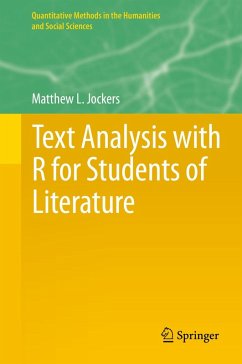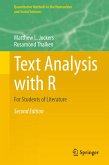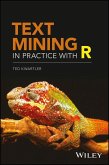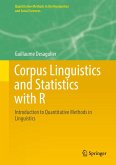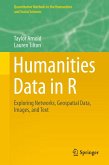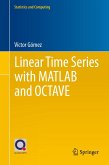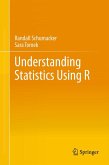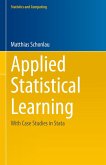Text Analysis with R for Students of Literature is written with students and scholars of literature in mind but will be applicable to other humanists and social scientists wishing to extend their methodological tool kit to include quantitative and computational approaches to the study of text. Computation provides access to information in text that we simply cannot gather using traditional qualitative methods of close reading and human synthesis. Text Analysis with R for Students of Literature provides a practical introduction to computational text analysis using the open source programming language R. R is extremely popular throughout the sciences and because of its accessibility, R is now used increasingly in other research areas. Readers begin working with text right away and each chapter works through a new technique or process such that readers gain a broad exposure to core R procedures and a basic understanding of the possibilities of computational text analysisat both the micro and macro scale. Each chapter builds on the previous as readers move from small scale "microanalysis" of single texts to large scale "macroanalysis" of text corpora, and each chapter concludes with a set of practice exercises that reinforce and expand upon the chapter lessons. The book's focus is on making the technical palatable and making the technical useful and immediately gratifying.
Dieser Download kann aus rechtlichen Gründen nur mit Rechnungsadresse in A, B, BG, CY, CZ, D, DK, EW, E, FIN, F, GR, HR, H, IRL, I, LT, L, LR, M, NL, PL, P, R, S, SLO, SK ausgeliefert werden.
"The aim of this book is ... to give the Literature students just the most basic tools needed to do some relatively straightforward textual analysis. ... Even though this is primarily a book intended for literature students, I would actually strongly recommend it to anyone interested in text mining, text analysis and natural language processing. It is a very gentle and approachable introduction to the whole world of textual analysis." (Bojan Tunguz, tunguzreview.com, July, 2015)
"This is a well written book on the topic of Text Analysis. There is enough information to give you a good start using R. Followed by easy to understand details about text analysis. ... This is a good book to have if you are doing text analysis." (Mary Anne, Cats and Dogs with Data, maryannedata.com, August, 2014)
"A remarkably well-crafted book that will allow students to get a quick start and progress toward quite sophisticated text mining tasks. ... exercises provided at the end of each chapter, withsolutions at the end of the book, should serve well to help students solidify their knowledge and gain more confidence in their text mining skills. ... a great addition to the libraries of digital humanists and natural language enthusiasts who wish to expand their programming literacy ... ." (Denilson Barbosa, Computing Reviews, August, 2014)
"This is a well written book on the topic of Text Analysis. There is enough information to give you a good start using R. Followed by easy to understand details about text analysis. ... This is a good book to have if you are doing text analysis." (Mary Anne, Cats and Dogs with Data, maryannedata.com, August, 2014)
"A remarkably well-crafted book that will allow students to get a quick start and progress toward quite sophisticated text mining tasks. ... exercises provided at the end of each chapter, withsolutions at the end of the book, should serve well to help students solidify their knowledge and gain more confidence in their text mining skills. ... a great addition to the libraries of digital humanists and natural language enthusiasts who wish to expand their programming literacy ... ." (Denilson Barbosa, Computing Reviews, August, 2014)

